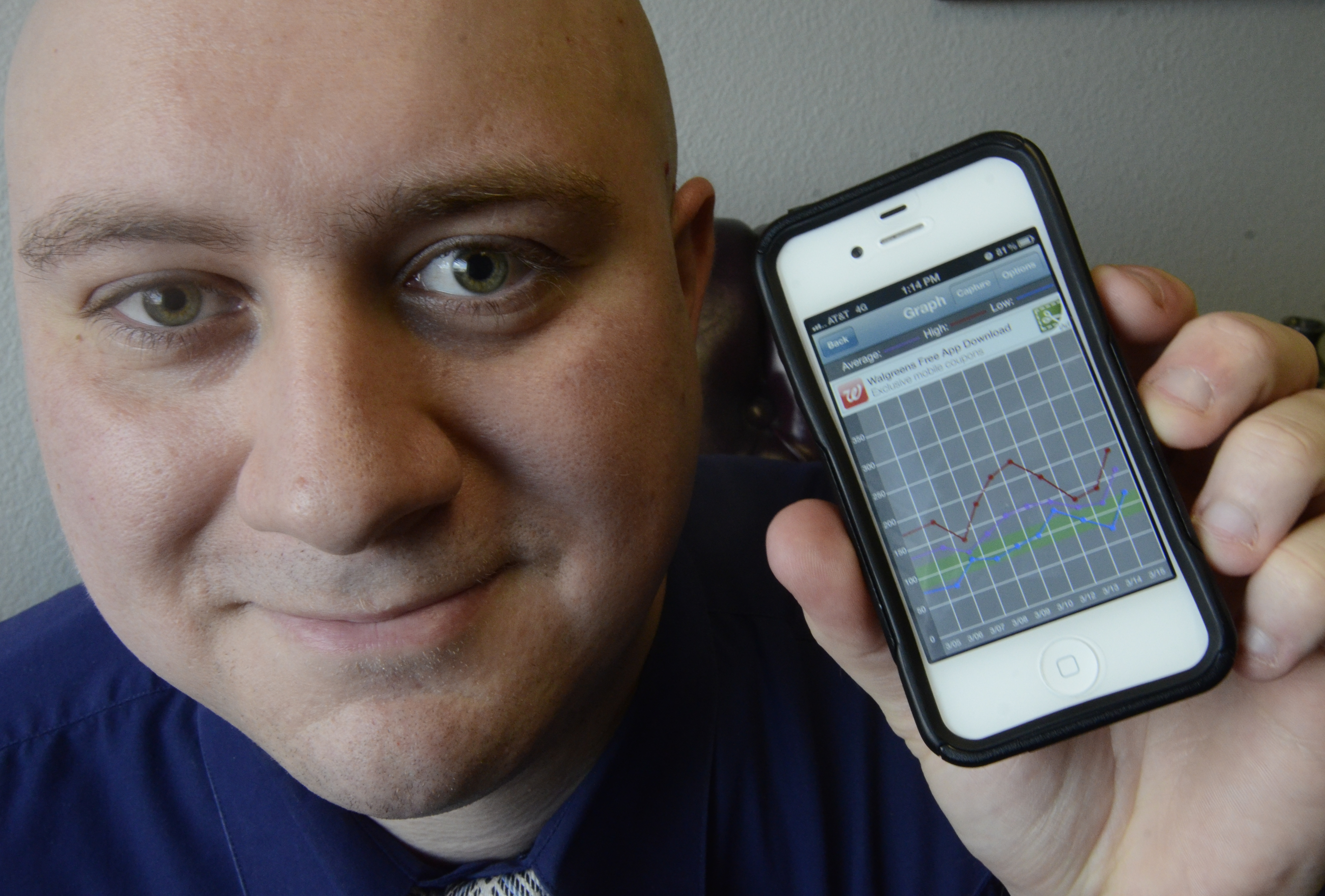Five or six times a day, Ben Zani grabs his iPhone and types his blood glucose levels into an application. After every meal, he inputs what he has eaten and the app tells him how much insulin he should use.
It's Glucose Buddy, a medical app the 29-year-old Zani calls "literally a lifesaver."
Diagnosed with Type I diabetes when he was 14, Zani began using Glucose Buddy three years ago.
"If I didn't have this available, I'd be a much worse diabetic; my blood sugar levels have very much improved since I'm using it," said Zani, who works as an administrator in training at Life Care Center of East Ridge.
In the last few years, more doctors and their patients are turning to medical applications for smartphones and tablets -- known as "mHealth" among medical professionals and researchers.
Whether you have diabetes, a food allergy, cancer, need to track five medications or know when to take your blood pressure medicine -- there's an app for that.
The number of users downloading mHealth smartphone applications is expected to nearly double in 2012 compared to last year, with 247 million users and $1.3 billion in revenue, according to medical research specialists Research2Guidance.
There are thousands of medical apps such as Glucose Buddy or Epocrates, a diagnostic app frequently used by doctors. Even more apps fall into the health-and-wellness category, apps that track fitness, calories, food and exercise.
But recent studies from the Pew Research Center found that use of medical apps remains quite low, with only about one in 10 cellphone users downloading a health app. Even fewer use them on a regular basis.
"The potential is high, but -- for now -- the adoption is low," said Susannah Fox, associate director of digital strategy at Pew.
Fox said the center plans to do additional research this year that will look more closely at why so few people use health apps. So far, little research has been done on the effectiveness of the apps or how they are used, she said.
It is also impossible to know how many apps are out there, since there is no definition of exactly what a medical app is, she noted.
"If anyone gives you a number, don't believe them," she said.
Johns Hopkins University recently launched a major research initiative on mHealth, which may provide valuable insight, Fox said.
Last summer, the Food and Drug Administration said it would start giving FDA approval for certain mobile medical apps and released draft guidelines for such apps. Some people criticized the move, saying getting the FDA involved will increase the costs of developing the apps and slow the process to a crawl.
But FDA officials said they will only monitor and approve a "small subset of mobile medical apps that impact or may impact the performance or functionality of currently regulated medical devices," according to a news release.
FDA spokeswoman Erica Jefferson said this week that they have only approved a "handful" of medical apps so far. The FDA hopes to finalize its guidelines about medical apps this year, she said.
An important component of implementing medical apps may also be found in the demographics of smartphone users, Fox said. Only about 46 percent of American adults have a smartphone, but 71 percent of 25- to 34-year-olds own one. More financially well-off and more-educated people are also more connected.
But younger people are less likely to be ill or need medical apps, Fox said.
Dr. Carlos Baleeiro, a pulmonary specialist and critical care doctor at Memorial Health Care System, said he uses medical apps every day, but so far has not recommended any to his patients.
"There's not a lot of information about the apps," Baleeiro said about patient-care apps. "But everybody can use a healthy lifestyle app; those are more useful to everyone."
Medical apps have made him a more efficient and better doctor, Baleeiro said. He has used Epocrates on a daily basis for about five years and regularly turns to others such Medscape.
Epocrates allows him to type in a patient's weight, height and other data to compute a medication dosage. He can also enter the various medications a patient uses to see if there are any conflicts or problems with a new prescription.
"You can't memorize every single medication and every single variation," Baleeiro said.
Medical apps also allow him to look up less-common or unusual illnesses and see what medication may be best to treat it.
"I think it makes me a more productive doctor and I can give immediate feedback to a patient," he said. "I don't have to go look it up in a textbook and get back to them later."
Frank Bradford, market pharmacy director at Parkridge Medical Center, said he believes the medical app field is still being developed but it has great potential.
Bradford serves as a consultant for a medical app being developed in Chattanooga. The app is still in early stages but will show a picture of a medication, what is used for and allow patients to look up various reactions and information when they need to take the medication.
"Such apps will increase patient safety and knowledge," Bradford said. "There's a real need for it; so many patients just don't understand their medications or what they are taking. It could be really useful."

